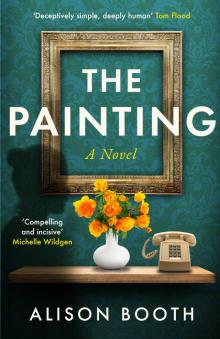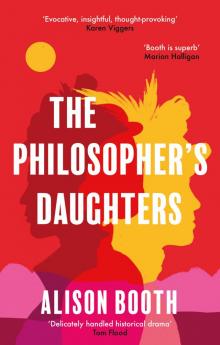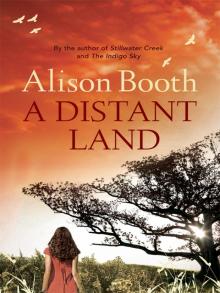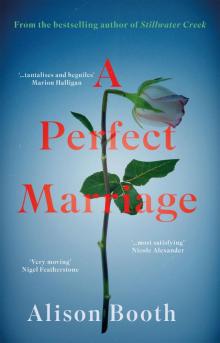- Home
- Alison Booth
A Perfect Marriage Page 3
A Perfect Marriage Read online
Page 3
My mother didn’t seem too good either. Only for Charlie was she managing to keep a bright voice and smile. This hurt more than I thought it could; that she was trying so hard. But Charlie was still treating the trip as a holiday and when she was at the local school my mother spent all her time outside. In the late afternoon, once the light faded and while Charlie was watching a DVD, I caught sight of my mother at the top of the garden, surrounded by a pile of weeds, her arms hanging loosely by her side. For ten minutes she didn’t move while the shadows lengthened around her. She just stood there, staring out to sea, her shoulders folded inwards.
* * *
It was a complete surprise when the police dropped by. I was glad my father answered the door and not my mother. We were in the garden having breakfast when they rang the front doorbell. My father went inside and a few moments later fetched me in; I carried my half-empty mug of coffee with me. He led me not to the sitting room but to his study. That seemed odd. Two police officers, a women and a man, stood awkwardly in front of the desk, as if waiting for a dressing-down by the headmaster. The woman was young, barely twenty-five, and looked as if she was growing out of her uniform, while the man, who was around forty, I would guess, was holding in front of him his peaked cap with the black and white chequered band around it. He introduced himself as Sergeant Trevellyan. Both officers refused to take a seat when my father offered. Avoiding their serious faces, I glanced around the room. It was then that I noticed that the newspapers from earlier in the week were piled on top of one of the bookcases, well out of Charlie’s reach. My agitation grew and my hand began to shake. Carefully I put down my coffee mug on my father’s desk.
‘We need to speak to Mrs Hector alone,’ the taller one said when my father looked as if he was about to shut the door and make himself comfortable. The man had a gentle voice and a strong local accent. After my father had gone, he suggested I sit. Once I did so, a few seconds passed when all I could hear was the ticking of the clock on the mantelpiece and the heavy breathing of the older police officer. Through the open window I could see Charlie piling grass clippings onto an old tray, while my parents sat, talking intently, on a faded garden bench. A seagull flew overhead, its call evoking happier memories of long summers by the sea.
‘I’m sorry to have to tell you, Mrs Hector, that your husband’s been found dead in London,’ Sergeant Trevellyan said.
‘That’s impossible,’ I said. ‘He’s barely thirty-one and very fit. And I saw him only a few days ago.’ I’d been trying to blank out that day but now I ripped aside the frail fabric of forgetfulness and resuscitated the memory. Surely what had happened to Jeff then couldn’t have killed him. He’d been on his feet and out the front door of my building in a flash.
‘I’m afraid it’s the truth.’ The policeman’s voice had become even more soothing.
My throat felt constricted. I took a deep breath before saying, ‘Why haven’t the London police contacted me?’
‘It’s protocol. The Met called us and that’s why we’re here. It has to be done face-to-face, you see.’
There was a pause. I could hear my heartbeat pounding in my inner ear. I said, ‘Where did my husband die?’
‘At the flat of a friend, apparently. Someone called Steve James.’ There was another pause before he added, ‘I understand you’re separated from your husband.’
‘I am.’
‘Did you know that he took drugs?’
I answered that I didn’t. The policeman explained that it looked as if Jeff had died from complications from a head injury that were made worse by a cocktail of drugs and drink. I guessed what this meant. That the bang on his head that he got when he fell must have been preceded by – or maybe followed up by – substance abuse.
‘The Met want you to go up to London to identify the body and you’ll be needed for an interview.’
This would be my second journey up to London this week and I couldn’t bear the thought of it. I tried to focus on the ghastliness of the train journey rather than on what I would find at the other end. The policeman gave me some procedural details about where to go and who to report to. I scribbled his instructions on a piece of blank paper that I found on my father’s desk. Having something to do with my hands was one way of concealing my anxiety. It didn’t stop the queasiness though. The coffee in the mug I’d put down earlier smelled revolting and I held my breath as I shifted it onto one of the bookshelves.
No sooner had the police officers gone than Zoë rang.
‘I’m so sorry, darling,’ she said. ‘I’m so terribly sorry this has happened.’
I mumbled some response.
‘When are you coming up to London?’
‘This afternoon.’
‘They’ll have to interview each of us again.’
‘I know.’
‘Sally, can I see you?’
‘If you must but I saw you only a few days ago.’ My voice sounded cracked and I swallowed to clear my throat. If only my head could be so easily cleared. It felt as if were stuffed with cotton wool that was slowing down my thought processes.
‘We barely spoke that time.’ Zoë’s voice sounded too loud and I wanted her off the phone.
‘It was for long enough.’
‘Well, we both know what happened.’
‘So do the CID.’ That interview only days before had gone on and on.
‘We just don’t know what happened afterwards. Did they tell you anything?’
‘Only that he probably died of a drug overdose and a head injury. What did they tell you?’
‘Much the same.’
After replacing the receiver, I saw through the window that Charlie had filled two small plastic dishes with grass clippings, and was carrying them to her grandparents. I heard her clear voice saying, ‘This is your pretend lunch and I’m in charge.’ My mother laughed at this; the first time I’d heard her laugh for days.
She wouldn’t be too happy when she learned I had to go to London again, and why.
Chapter 6
NOW
‘Hello!’ Zoë calls from the bottom of the steps leading up to our front door. ‘I’m sorry I’m late.’
Charlie and I meet her on the landing. She’s wearing a fine wool charcoal trouser suit, which sets off to great advantage her cropped platinum blonde hair. She kisses Charlie first, on both cheeks, ‘Mwah-mwah,’ and afterwards adds one more, ‘mwah.’
‘Dutch style,’ she says. ‘I’ve just come back from Amsterdam, literally this minute, straight from the airport.’ She hands Charlie a bottle of wine. ‘Here’s something to take your mind off work. And something sweet for later,’ she says, giving me a large paper bag. Her shrug is apologetic, as if bringing a present is a gesture I might find unwelcome. She turns back to my daughter, who is beaming at her. ‘How grown up you look, Charlie! Just like a model. Lucky you to be so slim. I’ve always had to watch the calories.’
‘Come in out of the rain,’ I tell her. It’s a wet Thursday evening and people are scurrying along the footpath, bent into their umbrellas as much for protection against the wind as the rain. In the face of this weather, it’s hard to imagine that Vigo was little more than a week ago.
Next it’s my turn for Zoë’s inspection. ‘Sally, you’re looking gorgeous. How clever to have those colours together. That yellow shirt with the red trousers looks fabulous with your hair.’ Zoë has the gift of making everyone she talks to feel wonderful. I threw on my clothes today more or less at random.
‘Tonight I’m celebrating,’ Zoë says.
‘What?’ Charlie asks.
‘My new man.’
‘What was wrong with Jon?’ Charlie’s voice is pitched higher than usual. ‘You haven’t gone and ditched him, have you?’
‘All over, darling.’
‘You’ve only been with him a few months.’ Charlie finds Zoë slightly shocking, as I did once. Charlie would hate it if I behaved like Zoë, but Zoë’s behaviour augments rather than diminishes Charlie’s fas
cination with her.
Zoë waves an arm, the gesture theatrical. ‘Didn’t I tell you?’ She knows full well that she hasn’t, and she pauses for effect. ‘Jon and I broke up last month, not long after I met this really dishy Dutch man in Amsterdam. It was love at first sight.’
‘Well, I hope you’re practising safe sex,’ says Charlie darkly, as if she is decades older than Zoë. If Charlie were not my daughter, I would find this role reversal amusing. I look at the pale oval of her lovely face, her delicate features and high cheekbones; she looks like her father when he was young. The dream I had in Vigo flashes back briefly and I push it away. All of a sudden I think of Marge’s packet of photos and things. They will be on their way to Charlie soon and I still haven’t told her what she needs to know about her father.
‘Of course I am, Charlie,’ says Zoë. ‘I have to set you a good example.’
‘You’re a lousy role model for the youth of today.’
I pour Zoë and Charlie each a glass of wine, and leave them to it, while I dash downstairs to the kitchen to make the final touches to our supper and set the table. How confident Zoë is and how essentially uncomplicated, I think as I dress the salad. She practises serial monogamy except at the point of transition between relationships, when she practises bigamy. In the ten years that I’ve known her she has had just one period without a man. That was after I first met her and it only lasted four months. She does what she wants, taking on new men and dumping old ones with an extraordinary ruthlessness. Yet as a friend she is one of the most loyal women I have ever met and I love her like a sister.
Sometimes I envy her uncomplicated attitude to sex. I tried to follow her example once. Not immediately after Jeff died, but later. In the first two years after his death I avoided men altogether – apart from my colleagues. When I was nearing thirty and started to go out with men again, I picked them younger than me, men who wouldn’t threaten me in any way. And my behaviour was not unlike Zoë’s, dating them and then dumping them as soon as anything serious threatened; dumping them before they could dump me. I pretended to myself that I wasn’t hurting them; because they were so much younger than me, they must have known it couldn’t last. And I never let these men come home, never let them meet Charlie. I used them I suppose, and not solely for pleasure. It was for my ego, to prove that I was still attractive, to prove that I was sexually competent. But once Charlie turned thirteen, once she became an adolescent, I felt obliged to stop this behaviour: it became impossible to do what I would disapprove of her doing. It was at this point that I noticed that all the men of my own age had gone – partnered, married, out of circulation – and unlike Zoë I could never sleep with another woman’s partner.
When I join Zoë and Charlie in the living room, I’m surprised to discover that Zoë is still talking about her personal life. Charlie is hanging on to Zoë’s every word.
‘You’ll never guess what I found out about Jon.’ Zoë’s voice is almost a whisper, although I can hear her clearly from the door. She leans towards Charlie, their two blonde heads almost touching. This is Zoë’s conspiratorial way of talking, and one that she often adopts. It flatters listeners into believing that they are the uniquely chosen recipients of her confidences. She says, ‘You know how clever Jon is. Surely I’ve told you about all those lovely notes he used to leave?’
Charlie nods, but Zoë tells us again. ‘I’d find yellow Post-it stickers all around my flat, with bits of love poetry on them.’ She sighs. ‘I kept them all of course. I’m such a romantic.’ She pauses, while I refill her wine glass. ‘Not long after I told him it was over,’ she continues, ‘I packed up his things and took them to his flat.’
Zoë may seem like a romantic, but she is first and foremost a realist. She refuses to let any man move in with her; she is frightened she would lose her independence. But she does allow them to leave a few possessions in her flat. ‘He wasn’t in, but I still had his keys, although we hardly ever met there. So I let myself in and thought that while I was there I might as well have a quick look around.’
‘You snooped.’
‘No, Charlie, I just wanted to see if I’d left any of my stuff there. And do you know what I found?’
She pauses for breath and opens her large, almost-black eyes very wide.
‘What?’ Charlie and I chorus.
‘A book of love quotations on his desk. He’d got all those things out of a book.’
Her laughter is so infectious it’s impossible not to join in. ‘Never trust the romantic ones, darlings,’ she says, wiping away tears of mirth.
‘Does it matter that he hadn’t written them himself? He did love you, after all.’
‘It matters because I thought he’d made them up, and he knew that.’ Zoë is emphatic on this point. Over the years I’ve learned that she has high standards, and ones that are not always predictable. ‘That’s plagiarism, isn’t it?’
‘True. But he wasn’t sitting an exam. He was just telling you his feelings.’
‘Let’s not talk of exams with poor Charlie suffering so.’ Zoë smiles sympathetically at Charlie. ‘What else have you been up to? Any more all-night orgies like the one you had when your mum was in Spain?’ Zoë winks, but it’s not clear whether this is directed at Charlie or me.
‘Just the usual. Drugs, sex and rock ‘n’ roll.’
‘Is that all?’
‘Isn’t that enough? Don’t you start putting pressure on me to rebel. Like, Mum’s been doing that ever since I turned sixteen.’
Dinner is almost over when the phone rings. ‘For you, Charlie,’ I say automatically, but she is already on her way to the extension upstairs.
‘Charlie’s working really hard,’ I tell Zoë. ‘Thank God things were easier in my day. I don’t remember studying much for the A-levels, and I still got into the university I wanted.’
‘Don’t be so smug.’ Zoë pours us each more wine. ‘That was nearly twenty years ago. You’ve probably forgotten how hard you worked.’
‘I’ll never forget the exams. My stomach was growling all through the maths paper and I was covered in a ghastly rash the whole time.’
‘There you are. Different people react differently. I’m glad I wasn’t a don’s daughter. The pressure on Charlie must be enormous.’
‘Self-imposed.’
‘She adores you, Sally. And she knows what will please you.’
‘I’ve never suggested she goes to university.’
‘But it’s all implicit these days. I was lucky. No-one in my family had done GCSE maths before me, so they all thought I was a genius when I got a B. Relatives kept taking me to one side and slipping me five quid. That’s why I went on to do A-levels.’
Zoë clears the table while I make coffee. ‘You’re looking very well,’ she says, while I load up the tray with the cafetière and some cups. ‘Not that you don’t normally of course. Has something happened? How are you getting on with that shrink of yours?’
‘Helen? I’d like to talk about Jeff but I haven’t had the opportunity yet.’
‘I thought you made the opportunities. Isn’t that what it’s all about? You don’t get only one chance at happiness, Sally. You’ve got to get the past out of your system.’
‘I’ll get round to it.’
‘If the sessions aren’t going anywhere, why’ve you been looking so pleased with yourself all evening?’
‘Have I?’ I can feel a surge of blood working up my neck and into my cheeks. ‘You don’t miss much. I met a rather nice man last week. About my age, well, a little bit older. The nicest I’ve met for some time.’ I wonder why I’m telling Zoë this. Part of me wants to forget Anthony. He is attractive but threatening too, threatening to the fragile equilibrium I’ve reached over the past few years. And maybe he is just too perfect.
‘At last. Well, what are you going to do about it?’
‘Wait and see.’
‘Do get on with your life, Sally. Charlie’s almost an adult and you’ve done a terrific job br
inging her up. But she’ll be gone soon. It’s time to consider your own future.’
‘You sound like my mother.’
‘A very sensible woman, I’ve always thought. What’s he like?’
Briefly I describe Anthony, leaving out the bits about how appealing I found him. I don’t want to tell her too much in case nothing ever comes of this.
‘He sounds very suitable. I’d like to meet him.’
‘He’s gone off to Harvard for four months, so that’ll be a bit difficult.’
‘Oh darling, you do pick them! Did you find that out before or after you decided you fancied him?’
‘Cheap psychology, Zoë.’ Though I smile at her, I feel confused, rocked by opposing emotions: wanting to see Anthony again but at the same time wanting to avoid what might follow. Wanting to see him again but wanting to avoid being hurt if he doesn’t contact me. While he promised on the terrace in Vigo to call me, what if he doesn’t? That evening I should have made the effort to find a pen to write down my phone number instead of simply agreeing with his suggestion that he check me out online.
After Zoë leaves, I go outside. The rain has stopped but the steps leading into our garden are wet. I turn the back doormat upside down and sit on the side that is relatively dry. Anthony surfaces in my mind, like a piece of music that I can’t get out of my head. Charlie’s elderly cat, Tico, wraps himself around my legs and purrs loudly while I rub him behind his ears.
When the phone rings I jump to my feet but it turns out to be next door’s. In a year’s time Charlie will be going to university. And when she goes, there will be a gaping hole in my life.
Chapter 7
THEN
From the train, Charlie and I had watched the sun sink below the horizon, a dark red ball veiled in a haze of evening mist. Earlier that afternoon I’d collected Charlie from school and whisked her and our kitten, Tico, off to catch the train to Cornwall to stay with my parents. I had to get out of London; I couldn’t bear the thought of being contacted by journalists. And I couldn’t bear the thought that Jeff might try to see Charlie and me. On the train, after we’d opened the packets of sandwiches I’d bought for the journey, I told Charlie that we wouldn’t be sticking with the last name of Hector. I was researching under the name of Lachlan and things would get too confusing otherwise. Of course I didn’t tell her that the real purpose was to confer anonymity, so the press couldn’t track us down. So Charlie became Charlotte Hector Lachlan, but of course she never told anyone that was her name, because even a young school kid knows that double-barrelled names set you apart somehow, and she never wanted to be set apart. From that time on she was simply Charlotte Lachlan.

 The Painting
The Painting The Philosopher's Daughters
The Philosopher's Daughters A Distant Land
A Distant Land A Perfect Marriage
A Perfect Marriage Stillwater Creek
Stillwater Creek The Indigo Sky
The Indigo Sky